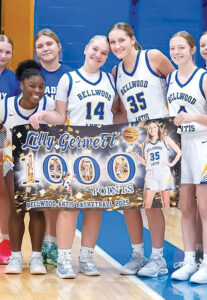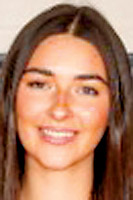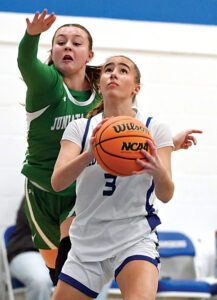Heights grad enjoys life as an official

Courtesy photo Big Ten football official, and Cambria Heights grad, Brad Hudak poses with his parents, Ann and Butch, at a recent bowl game.
By John Hartsock
jhartsock@altoonamirror.com
Cambria Heights High School graduate Brad Hudak started what has been his long, successful, and very eventful career in sports officiating as a Little League Baseball umpire in his hometown of Patton back in the late 1990s.
Now living with his wife and their three children in the Butler County town of Evans City, Pa., Hudak, 44, has enjoyed a continually upward trajectory in the officiating realm, advancing from the high school football officiating ranks to college gigs in the Football College Subdivision (FCS) Missouri Valley Conference and Football Bowl Subdivision (FBS) Mid-American Conference before being hired by the Big Ten Conference back in 2017.
Hudak — who works as an umpire on the football field, standing directly behind the linebackers on defense — has had some great experiences in his eight years as a Big Ten football official.
This past season alone, he has been a member of the crew that worked the Texas-Michigan game in September in Ann Arbor, Mich., the Alabama at Wisconsin game the following week, and two key November conference games — the Indiana at Ohio State matchup and the Notre Dame-USC regular-season finale in the Los Angeles Coliseum.
“It was great this year with the new schools joining the Big Ten,” Hudak said. “I got to work at the Rose Bowl in Pasadena (California) for (a) UCLA (game), and I got to work the Notre Dame-USC game in the L.A. Coliseum. It was good to go see historic stadiums like that for the first time.”
Hudak cites his most memorable career officiating opportunity to date as the Jan. 1, 2021 Rose Bowl game between Notre Dame and Alabama — which was moved from Pasadena to AT&T Stadium in Arlington, Tex., because of the COVID-19 pandemic.
“It was played in Texas that year, but it was still the Rose Bowl,” Hudak said. “It doesn’t matter whether they played it in Pasadena or Arlington – that one sticks out for me because the Rose Bowl is the grand-daddy of them all.”
Hudak has also had the opportunity to work two Orange Bowl games, and his most recent assignment was at the East-West Shrine Bowl at AT&T Stadium in Arlington this past Jan. 30.
For all of his thrilling on-the-field assignments, however, Hudak said that the most important and rewarding facet of his officiating career has been the network of friends and associates that he has met through officiating, along with the chance to learn from the best of those officials, as well as the opportunity to give back himself by mentoring other young officials or prospective officials who are just starting out in the profession.
“Honestly, it’s definitely the friends that I’ve made through all of this,” Hudak said when asked what has been the most fulfilling and rewarding part of his officiating career. “It’s amazing the number of people who I can talk to just by picking up the phone and calling them to discuss a play or an issue that I may be facing.
“These include officials who might have worked Super Bowl games or who are still working Super Bowls, or national championship college games – people who I never thought that I’d have the opportunity to be talking to when I started in officiating over 25 years ago,” Hudak added.
Praise for Tom Link
Hudak lists Tom Link, the late Cambria Heights athletic director and long-time PIAA football official, as being one of the most influential and positive mentors in his career development as an official.
“One gentleman who made a big impact on my career was Tom Link, who unfortunately, passed away a few years ago and is no longer with us,” Hudak said. “When I first moved to the Pittsburgh area, I knew nobody here, but Tom Link knew everybody here in officiating, and he helped to get me into the right chapter of football officials here, and he talked to a couple of people here who looked after me.”
Link always made himself available to guide Hudak along.
“Tom really helped me to develop as an official, and I was always able to call him up during the football season and we’d talk about a game that I worked, or he would answer any questions that I had,” Hudak said. “I would have never gotten into college football had it not been for Tom and some of his officiating friends.
“Being put on a high school football officiating crew with some of Tom’s better friends here was so important in my officiating career, because they were the people, who, after I had worked one year of high school officiating, convinced me to get into college officiating,” Hudak added.
One of Hudak’s officiating friends and associates in Paul Sroka, who lives in Pittsburgh. Sroka and Hudak’s officiating bond goes back over two decades, and includes both high school and college officiating.
Sroka and Hudak worked WPIAL high school football games together on the same officiating crew in the Pittsburgh area back in 2002 and 2003, then worked on the same collegiate officiating crew in the Mid-American Conference from 2009 to 2016.
Sroka, who currently splits the college football seasons working games in the FBS Conference USA and FCS Southland Conference, said that Hudak took to officiating like a fish takes to water.
“Brad is one of the brightest rules guys I’ve ever been around,” Sroka said. “I got Brad on my crew when he was a 23-year-old guy, and he had an immediate feel for the game when we were officiating together at the high school level.
“He knew how to man the umpire position, and he controlled things in the middle of the field so that nothing got out of hand,” Sroka said. “It was apparent right away that he has very good judgment. We later worked together in small college conferences, before working together in the Mid-American Conference. All those years with Brad, and nothing ever changed. He has always had outstanding rules knowledge, and he has always been a good communicator on the field. I can’t say enough positive things about Brad.”
And now, Hudak realizes the importance of paying forward the guidance that Link and other veteran officials like Sroka provided him in his formative years in the profession.
“I need to always focus on where I am now, and to be the best that I can be there,” said Hudak, whose educational background is in engineering and technology and whose full-time occupation is as a program manager for a Pittsburgh area marketing systems organization. “But I also always want to give back to the officiating profession, because that’s the thing that I was taught coming up through the ranks – to give back.
“I need to continue to help newer, younger officials, and help out the (NCAA) Division II and Division III officials as part of the group that I am associated with,” Hudak said.
Hudak does his part in this realm by observing high school football games on the weekends that he is off during the Big Ten Conference football season, as well as by attending clinics all over the country to mentor and encourage younger officials, and by providing Zoom calls to share the knowledge that he has accumulated over his career.
“It’s about taking the time to give back, to help others to become better, and what’s amazing is that you become a better official by teaching others more than from learning from some one else all the time,” Hudak said.
Hudak has a nephew who lives in Coatesvile, Pa, is a college student at Millersville University, and is a budding PIAA football and baseball official.
“I had the opportunity to speak at the PIAA officials convention this past year, and I had my nephew come up there and I was able to introduce him to a lot of people who I know in officiating,” Hudak said. “I am trying to get him hooked into the right (officiating) chapters so he can learn, work games, and become a better official,” Hudak added. “Without the network of friends that I have made in officiating, I would never have had that opportunity.”
Composure is important
Hudak is part of an eight-person field officiating crew for the Big Ten games. Along with Hudak manning the umpire position, he is accompanied on the field by the center judge, the referee, the line judge, the head linesman, the field judge, the back judge, and the side judge. There are also two officials who are situated in the replay booth – a communicator and a replay official.
Hudak said that maintaining composure and having a balanced temperament is essential to having success in officiating.
Keeping things “calm in the midst of the storm,” as Hudak says, is vital.
“When the game is going on, we have a lot going on out on the field, so in a split-second, we need to decide the methodology that we need to incorporate in order to keep the players playing the game and not engaging in what we call ‘non-football acts’ after the play is finished,” Hudak said.
Different situations call for different responses by the officials.
“There could be a wide variety of methodologies that need to be used,” Hudak said. “One could be to be very strict, but sometimes, it’s about being very soft-spoken with the players, or adding a little bit of humor. It really depends on the situation, the players, and the game. You have to feel that out.”
Most often, players and coaches harbor no ill will toward the officials, even though it might not seem so at times.
“We’re out there dealing with players and coaches who have raw emotions, and sometimes, those players and coaches aren’t really complaining to you or aren’t really upset with you but they just want to vent a little bit, or they might just be upset with themselves or their own team,” Hudak said.
Greg Nelson, who lives in Arizona, works as the center judge on Hudak’s Big Ten Conference crew. Nelson has had a 16-year officiating alliance with Hudak, and places Hudak in very high regard.
The two have worked together since 2009, starting in the Missouri Valley Conference before moving on together to the Mid-American Conference and the Big Ten Conference.
“Brad is a great official, and even more so, he’s a great person,” Nelson said. “He’s a very knowledgeable official who possesses good common sense and a strong knowledge of the rules. Since I’ve known him, he has always carried himself in a very professional manner and he’s always ready to work.
“He’s a great crew mate, and that’s very important in officiating, because we’re all spending 10 to 12 weeks together each football season,” Nelson added. “He puts the crew first before himself.”
Making spontaneous decisions on plays, and having a short memory concerning the plays, is also among the top demands of the job for any official.
“As an official, you have to make lightning-quick decisions based on what you see on the field,” Hudak said. “The fans and spectators have the opportunity to look at multiple views of a play, or slow-motion replay, but the officials (only) have the opportunity to see a play once, and we have to process exactly what we see, and rule on it decisively at first glance.
“On top of that, an official has to have the ability to move past each call and each decision,” Hudak added. “You have to have the ability to compartmentalize and put each call in the past, and be ready to officiate the next play. Something that was said to me by a former official in the National Football League was to treat each play as its own game. If you can do that and move on without any baggage from the previous play, it’s going to help you to get through the game and it’s going to help you to become a better official.”
Knowing his stuff
Men and women must take tests to either become officials initially, or to stay in the game once they make it on to the field.
Hudak said that, fortunately for him, staying consistently up to date on rules, and rules changes, in football is something that he has always enjoyed doing.
“For college officiating, every official has to take a yearly college football officials (CFO) test, as well as a clinic test, which is a timed test,” Hudak said. “In our own (Big Ten) Conference, we also have to take weekly quizzes in the offseason, and the clinic test during the season.
“(The clinic test) is not just a basic, simple test – there are challenging questions in there pertaining to new rules, and recent rule changes,” Hudak said. “It also requires that you be able to apply the decision-making process as you’re reading each question, and because it’s a timed test, you don’t have all the time in the world to look at your rule book.”
The clinic test will determine which officials have stayed up to date on the rules, and which officials haven’t.
“If you don’t know the rules, this test will make that quite evident,” Hudak said. “Different conferences and different supervisors of officials have their own requirements about what you have to score on the test in order to keep working.
“Some supervisors will take you off assignments and you will lose games if you don’t score well on the rules test, or on certain other things throughout the season,” Hudak said. “Honestly, that’s up to the individual conferences and supervisors, but I’ve always been a rules buff, so I haven’t had to worry much about keeping up to date on all of the rules.”
Sroka believes that Hudak possesses the talent and ability to officiate in the National Football League.
“I have commented to others that I am shocked that he is not in the NFL,” Sroka said. “He just has all the qualities that I would look for in an NFL umpire, from his physical and mental attributes to his understanding of the game.
“Brad has already done a ton of big college games, and to me, Brad is the prototypical football umpire.”
Hudak admits to entertaining thoughts of someday officiating in the NFL, but his present focus is on the task at hand for him in collegiate officiating.
“The NFL is a dream, but right now, my goal is to become the best umpire in the Big Ten Conference,” Hudak said.
A rewarding career
Sports officiating isn’t for everybody, and it is certainly not for the thin-skinned.
It’s been a well-substantiated fact that officials in many sports and at many levels have been dropping out of the profession at a marked pace over the years, largely as a result of the unsportsmanlike conduct and verbal and even physical abuse that they’re often subjected to from fans, athletes and coaches.
“We need to build up the officiating ranks,” Hudak said. “The biggest issue that we have right now is our dwindling number of officials. I try to do my best to convince people to become officials, but it’s also very important that we retain the officials that we have.
“Honestly, the easiest part is to get people to try it – the hard part is retaining them,” Hudak added. “It’s not easy, especially with the poor treatment of officials and the poor sportsmanship that’s been showing up all over the place.”
Despite the headaches and difficulties, the rewards and friendships that are built through officiating make it well worth the tradeoff, Hudak maintains.
“I’ve been to places all over the world that I would never had the chance to visit had it not been for officiating,” Hudak said. “I tell people who are considering getting into officiating that there is a network of people out there that is going to help them to grow, that is going to help support them, and that is going to help them to become better officials.”
And many of the people that Hudak has met through officiating over the years have become his most devoted friends.
“It’s so rewarding because of all the friends that you make in officiating,” Hudak said. “That is what I treasure. I also have friends outside of officiating, but my closest friends are officials, because they’re the only ones who know what we go through, day in, day out, all year long.”
The Hudak file
Age: 44.
Current residence: Evans City, Pa.
Education: 1998 graduate of Cambria Heights High School; 2002 graduate, University of Pittsburgh at Johnstown, bachelor’s degree in engineering/technology; 2007 graduate, master’s degree, Duquesne University.
Family: Wife Leanne. Son Roland, 10, and twin daughters Paige and Tessa, both 6.
Employment: Hudak is employed full-time as a senior programs manager at Matthews Marketing Systems in Cranberry, and has had a long career as a college football official, including an affiliation with the Big Ten Conference since 2017.




